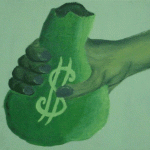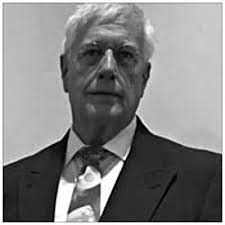 Stupid it is Greed
Stupid it is Greed
By Tarik Jan for VT
Imperialism, as British economist John Atkinson Hobson wrote in 1902, “is the endeavour of the great controller of industry to broaden the channel for the flow of their surplus wealth seeking foreign markets and foreign investments to take off the goods and capital they cannot use at home.” Hobson of course was no friend of imperialism and in fact his critique was later much quoted. He saw excesses of course; still it was a humane and limited view of imperialism, with an expansive toothy smile.
Today’s imperialism is not only funneling surplus funds abroad but also siphoning money from other countries to better its balance of payments, to renew its industrial vitality, and to secure its political and economical control over countries of its investments. Lenin’s perception of imperialism was not far from the truth when he described it as the culmination of capitalism marked by the economics of imperialistic exploitation.
Americans came later on the imperial scene but as early as the end of the 19th century they had begun to sing the song of imperialism in their throaty voice. Charles A. Conant pleaded for exporting surplus U.S. finds abroad as self-preservation – a means to employ saved capital as well as to sell surplus goods in foreign lands. “New markets and new opportunities for investment must be found if surplus capital is to be profitably employed,” he wrote in 1892.
One can see the truth of this statement in the following figures. In the 1970s, total U.S. multinational investment was $ 3.8 billion. The profit reaped from it amounted to $ 17.8 billion. In the following years, the U. S. earned for every one-dollar investment $ 10.00 return. In other words, it was 1000 per cent return. In 2006 alone, multinationals made $ 291.5 billions in earnings. According to reliable reports, their past decade profit has doubled.
The West in general prospered on cheap raw material from Africa and Asia which when processed into value-added produce gave them bloated incomes, money for military related research and new weapons of hegemony over other nations. The multinational phenomenon is a reincarnation of East India Company with a different edge. They make use of cheap labor, convert their earnings into dollars in the host country and then plough them back into their national economies leaving the host economy coping with the problem of an oversold dollar and a devalued local currency. They also spy, rig elections to have their clones in power and secure huge amount of civil and military contracts. If they meet resistance, they smother them to submission and compliance.
With all this, they are now ascendant on the world scene but their lust does not seem to have an end. “Their pursuit of wealth and power,” as Norman Cantor says, in his The American Century, “constitutes a process of dehumanization.” Small wonder, the West in general do not hesitate in genocides. Their friendship is fragile and so is their commitment to anything called international treaties. For them, a relationship is contrived to take advantage, as is evident in their relation with Pakistan, and not cultivated in reciprocity – something rooted in their psychology. “Imperialism,” as Cantor tell us “is a massive dehumanization and desensitization of the West that will slowly erode Western morality.” Cantor is also convincing in saying that the West will fail in it hegemonic drive over the East because of its contention with cultures that are powerful and beyond the West’s ability to understand their mysteries.
The East may have its mysteries; the West hides little when it comes to its grab of others’ riches. David Frum, a speechwriter in the Bush first administration, recounts his former boss say that “the war on terror” was designed “to bring new stability to the most vicious and violent guardant of the earth – and a new prosperity to us all, by securing the world’s largest pool of oil.” David Frum of course has no problem with the Bush vision of “prosperity for all” for he captions his Bush political biography as The Right Man. This may sound normal for a U.S. president to say, but it was heartless ignoring the extent of calamity it will cause to others’ lives.
Norman Cantor’s premonition that imperialism was going to make the West dehumanized and eventually cause erosion of Western morality had an apocalyptic edge to it. Post 9/11 was calamitous in the sense that it revealed the criminal side of the Western person – that it could plan to conquer, kill, and plunder with an altruistic face of saving humanity from the alleged Iraqi stockpile of weapons of mass destruction. Kevin Phillips’ American Theocracy (2006) admirably reveals the real side of the pantomime in Iraq. To him, it was Iraq’s plan to give oil concessions to Russia, China, and France that spurred Bill Clinton to hogtie Iraq by U.N. sanctions and thus prevent Saddam Hussein from allowing oil rights to them. Earlier Clinton had signed the dossier on Iraq PL 105-235 accusing Saddam of storing weapons of mass destruction, with subsequent signing of the Iraq liberation Act 1998, which called for regime change. His operations Phoenix Scorpion and Desert Thunder were the children of these two instruments.
Writing under the suggestive title of Centcom, Eurocom – and Oilcome, Phillips says that in 2004 Michael Klare, a strategist on resource wars, described oil as national security matter calling for protection “at any cost, including the use of military force.” Together with other influences, this brought a shift in the dispositions of the U.S. military. Most of the U.S. bases are now tied to oil resources and oil transportation considerations. “The new imperial frontier,” as Phillips says, “is the string of installations, guarding the pipeline corridors and oil-production centers…”
Small wonder, the U.S. today has Southcom in Colombia to assure oil supplies from the Cano Lemon pipeline, Eurocon to protect the Baku pipeline to the Turkish coast. The Pacific Command aims at protecting oil shipping in the Strait of Malacca that opens into the South China Sea. Centcom keeps its eyes on the Middle East and oil-rich Caspian basin covering most of the central Asian republics. This obviously explains why the Americans are spilling blood in Afghanistan for it is going to be an important base for its reach against Iran, Central Asia, and Pakistan.
Likewise, this new base-mania stretches itself to Nigeria, Gabon, Sao Tomé, Congo, and Angola in Africa. Phillips says the Africa oil for U.S. and its NATO allies could be a “middling rival to OPEC” in the U.S. estimation.
Oil as a strategic imperative however is hundred years old. In 1973 secretary of state James Schlesinger proposed oil war to Britain capturing oil wells in Saudi Arabia, Kuwait, and Abu Dhabi. Somehow Britain could not buy the plan. But it stayed as a policy imperative with the establishment.
In recent times, Dick Cheney’s role has been crucial. His 1999 speech to the London Institute of Petroleum speaks of the same economic concerns, when he said: “By some estimates there will be an average of two percent growth in global oil demand over the years released along with conservatively a three percent natural decline in existing reserves. This means by 2010 we will need an additional fifty million barrels a day.”
But this would not have helped the U.S. much unless there was a justifiable proxy to the oil war. Phillips reading of Michael Klare 2004 report says that oil premised military commitments … were being conflated with the war on terror: “anti-terrorism and the protection of oil supplies are closely related in the administration thinking.”
Call it the imperialist power’s sense of insecurity or its belief in power craft, there is an irony to it – the very self-realization of its power eventually becomes its weakness. Resistance comes from unimagined sources and new variables pop up to upset over and over considered calculus of domination and control. Second, power by its nature is expansive – it seeks space and domination. The U.S. has stretched itself long. What has happened to the Romans in the past or to the Soviet Union in recent times in consequence of their long stretch will happen to the United States as well. Third, the power stretch is always deceptive. The conflict in the periphery does not give immunity to the centre from the repercussive effect of the stretch, which will eventually thin it out.
As an imperial power, the U.S. can gorge itself to death by its own greed or eventually its internal compulsions may force it to restrain itself. But given others’ inaction, there is little chance that it will retire easily from the region. The United States could have learned from China and France that oil deals can be made mutually beneficial to the seller as well as the buyer without being gruff or dangling the power stick. But short as imperialism is on magnanimity or belief in coexistence, it goes for hegemonic monopoly over others inviting strife. The recent U.S. economic woes are the wages of its sins. And more may happen.
.

Gordon Duff posted articles on VT from 2008 to 2022. He is a Marine combat veteran of the Vietnam War. A disabled veteran, he worked on veterans and POW issues for decades.
Gordon is an accredited diplomat and is generally accepted as one of the top global intelligence specialists. He manages the world’s largest private intelligence organization and regularly consults with governments challenged by security issues.
Duff has traveled extensively, is published around the world, and is a regular guest on TV and radio in more than “several” countries. He is also a trained chef, wine enthusiast, avid motorcyclist, and gunsmith specializing in historical weapons and restoration. Business experience and interests are in energy and defense technology.
ATTENTION READERS
We See The World From All Sides and Want YOU To Be Fully InformedIn fact, intentional disinformation is a disgraceful scourge in media today. So to assuage any possible errant incorrect information posted herein, we strongly encourage you to seek corroboration from other non-VT sources before forming an educated opinion.
About VT - Policies & Disclosures - Comment Policy



